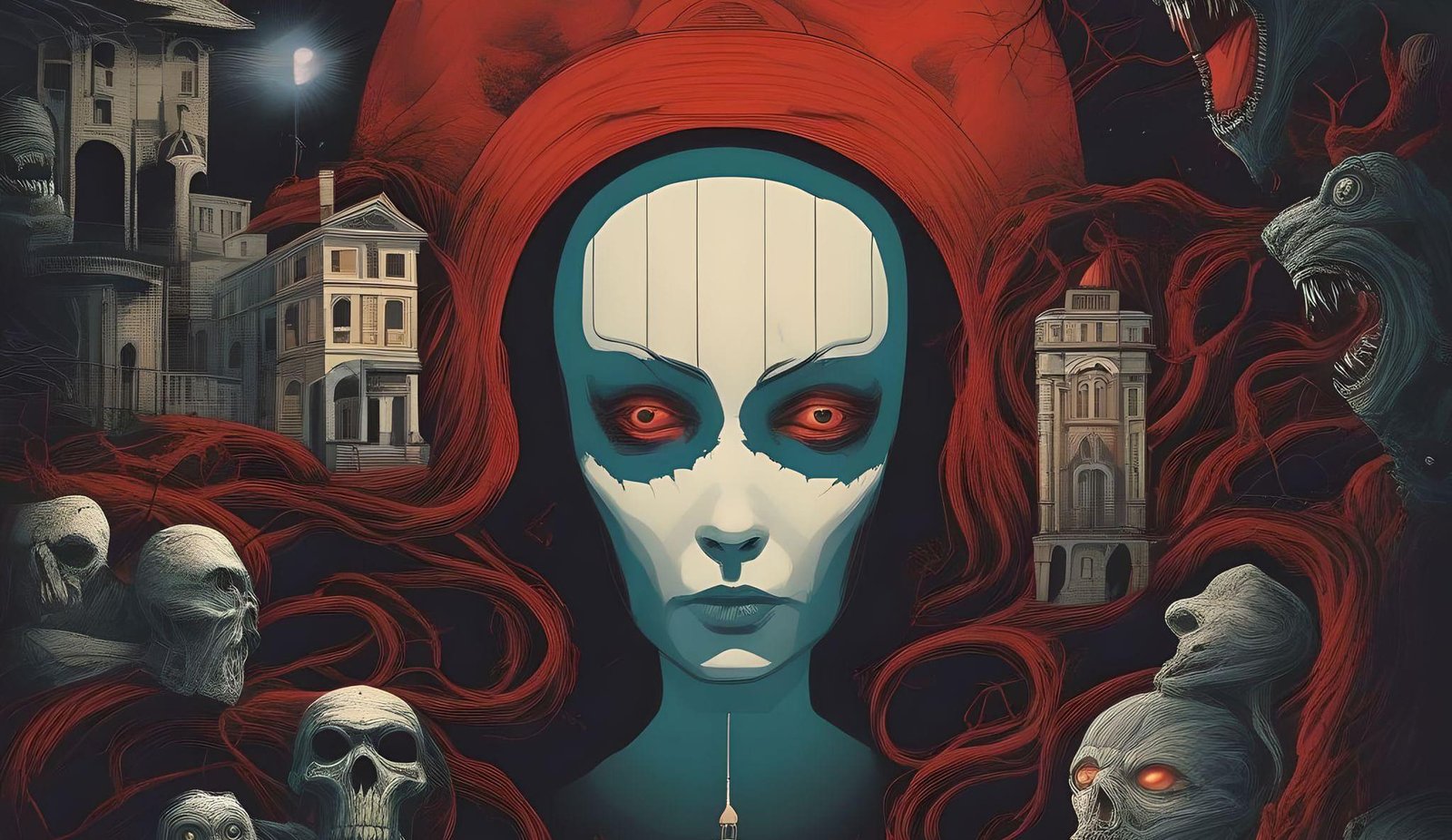The thirst for horror
Peering into the darkness, heart racing, breath quickening – why do we find such an exhilarating experience so alluring? As humans, it seems that fear itself holds an unspoken spell over us, one that’s expertly woven into the tapestries of horror and the galaxies of science fiction. But is it merely the thrill or the deeper psychological undercurrents that keep us coming back to the screen, the book, or the haunted house for more? In this exploration, we dig into the twisted roots of our love for the macabre and the fantastic, shedding light on why the genres of horror and science fiction have evolved to become cultural juggernauts.
The Euphoria of Fear: A Haunted History
Fear as Entertainment
From ancient campfire tales to modern-day multimillion-dollar blockbusters, the entertainment value of fear is as timeless as it is universal. Ghost stories around the hearth or the pulsating score of a horror film serve the same basic human need – a temporary rush of adrenaline and a reminder of our own mortality. But if we see horror as the oldest form of storytelling, then why is it that a good scare continues to endure in its storytelling power?
The Thrill of the Unknown
In horror, we don’t just confront our fears but actively seek them out. The unknown and the uncertain provide a crucial thrill that keeps the audience engaged. This could be through the supernatural, the psychological, or the philosophical, but at its heart, horror often deals with what we do not understand and calls upon us to contemplate the darker aspects of existence.
Catharsis and Control
Psychologists long ago noted that horror serves as a safe space – a domain where we can experience fear in a controlled environment. By watching a scary movie or reading a terrifying book, we experience an emotional rollercoaster with the security of knowing that, ultimately, it’s a temporary state. This controlled release of fear can be cathartic, offering a pathway to process the anxieties and uncertainties of our own lives.
The Alien Allure: The Science of Sci-Fi Fandom
Unintended Predictions
Science fiction not only appeals to our hopes and dreams but also to our collective fears. It acts as a funhouse mirror, reflecting a distorted image of society and a warning of potential dystopian outcomes. When science fiction writers and creators make unintended predictions that come to pass, the line between the fantastic and the real continues to blur, captivating and terrifying audiences in equal measure.
Imagining Ourselves Beyond Boundaries
At the core of science fiction is the fundamental human drive to transcend current limitations, to explore, and to evolve. The genre invites us to imagine worlds beyond our own, to consider what life would be like as something more – or less. In doing so, science fiction often grapples with existential questions, offering a pantheon of otherworldly creatures and civilizations as reflections of our own humanity.
Defining the ‘Human’ in Human Nature
By crafting characters and worlds that challenge the definition of what it means to be human, science fiction prompts us to rethink our values and our place in the universe. As we venture into the unknown through the eyes of science fiction, we question the very essence of identity and ethics, which is a deeply psychological inquiry at its core.
The Dark Side of Desensitization
A New Normalcy
In the 21st century, we have witnessed a remarkable desensitization to the themes of horror. What once shocked and appalled is now par for the course, leading creators to continuously push the boundaries of what we can handle. This desensitization process begs an important question: Are we losing something by becoming increasingly inured to fear-inducing stimuli, or are we simply adapting to a new normalcy?
The Fear of the Familiar
As horror tropes become clichés and science fiction becomes reality, the fear we seek is often not in the unknown but in the familiar. Our exposure to horror content has familiarized us with its patterns and conventions, in turn allowing for a more nuanced exploration of the terrors within, the ones we’ve become accustomed to and sometimes even find comfort in.
The Administration of Fear
This notion of controlled fear, though, comes with caveats. When fear is administered by external forces – be they political, social, or through the media – and becomes uncontrolled, the outcomes can be far from cathartic. We must critically evaluate how fear is used to influence behavior and opinions, as well as its potential to desensitize us to real threats.
The Future of Fear: Evolutions in Horror and Sci-Fi
Virtual Realities
With the growing accessibility of virtual and augmented reality technologies, the future of fear-centric entertainment is poised for a dramatic shift. These emerging mediums promise a level of immersion that can evoke fear in unprecedented and deeply personal ways, altering the very nature of our engagements with horror and science fiction.
Interactivity and Choice
Games and interactive narratives already toy with the traditional fear response, often giving players the agency to choose their fears or confront them head-on. By directly involving the audience in the narrative, creators have found new avenues to explore fear and its psychological impact, offering experiences that are not only to be watched but lived.
Social and Cultural Reflections
Horror and science fiction, at their best, serve as reflections of our collective fears and hopes. As we continue to grapple with real-world issues such as climate change, technological advancements, and societal tensions, we can expect the genres to evolve accordingly, providing not only entertainment but also a lens through which we can better understand our own fears and, consequently, ourselves.
Bridging Storytelling and Psychology
In our collective fascination with horror and science fiction, there’s an interplay between storytelling and psychology that illuminates the human experience. These genres offer a unique vantage point from which to observe the fears that have plagued us for centuries and the dreams that push us to the stars.
By understanding the psychological drivers behind our love for these genres, we gain more than just insight into our own nature. We learn how potent storytelling can be, shaping not only our culture but our very perspectives on the world. As we continue to unearth the mysteries that lie at the dark heart of our fascination with fear, we’re left with the ultimate realization: To be human is to be afraid – and yet, to be human is also to love a good scare.
Ready to dive deeper into the mystical realms?
 Explore more captivating content like this by checking out our blog post “5 Must Watch Horror Indie Scandinavian Films You Need to Watch During the Winter Months” Uncover the enchanting tales and intriguing folklore that will leave you spellbound. Click HERE to continue your journey.
Explore more captivating content like this by checking out our blog post “5 Must Watch Horror Indie Scandinavian Films You Need to Watch During the Winter Months” Uncover the enchanting tales and intriguing folklore that will leave you spellbound. Click HERE to continue your journey.












